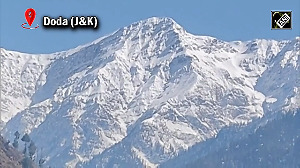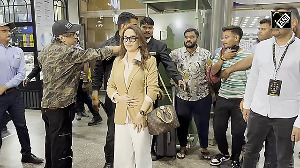Boris Yeltsin, the first-ever popularly elected President in Russian history after triggering the final collapse of the Soviet Union, has died.
Announcing the death of the ailing Yeltsin (76), Kremlin spokesman Alexander Sairnov gave no cause for the death or further information. The Interfax news agency cited an unidentified medical source as saying he had died of heart attack.
Yeltsin was widely hailed as an effective reformer but his era was a traumatic period in Russian history. His rule was marked by widespread corruption, economic collapse and enormous political and social problems.
In June 1991, vodka-loving Yeltsin came to power on a wave of high expectations. On June 12, Yeltsin was elected president of the Russian Federation with 57 per cent votes, becoming the first popularly elected president in Russian history.
Yeltsin's great moments came when he stood atop a tank to resist an attempted coup by Communists in August 1991 and engineered the peaceful end of the Soviet state on December 25 that year. But Yeltsin never recovered his popularity after the historic break-up of the USSR.
The radical economic reforms in early 1992 were widely blamed for devastating the living standards of most of the Russian population. By the time he left office in a dramatic address on New Year's Eve 1999, Yeltsin was a deeply unpopular figure in Russia, with an approval rating as low as two per cent by some estimates.
Following the dissolution of Soviet Union in December 1991, Yeltsin, vowing to transform Russia's socialist planned economy into a capitalist market economy, endorsed a program of 'shock therapy,' cutting Soviet-era price controls and introducing drastic cuts in state spending.
The reforms immediately devastated the living standards of much of the population, especially the groups dependent on Soviet-era state subsidies and welfare entitlement programmes.
By mid decade, Russia had suffered an economic downturn more severe than the United States or Germany had undergone six decades earlier in the Great Depression.
Through the 1990s, Russia's GDP fell 50 per cent, vast sectors of the economy were wiped out, income inequality and unemployment grew dramatically, hyperinflation wiped out many families' savings, and tens of millions of Russians were plunged into poverty.
In August 1991, Yeltsin won international plaudits for casting himself as a democrat and defying the August coup attempt of 1991 by hard-line Communists. But he left office widely despised as a desperate, ailing autocrat among the Russian population. As President, Yeltsin's conception of the presidency was highly autocratic.
Yeltsin either acted as his own prime minister (until June 1992) or appointed men of his choice, regardless of parliament. His confrontations with parliament climaxed in the October 1993 Russian constitutional crisis when Yeltsin called up tanks to shell the Russian White House, blasting out his opponents in parliament.
Later in 1993, Yeltsin imposed a new constitution with strong presidential powers, which was approved by referendum in December.
After the 1998 Russian financial crisis, Yeltsin was at the end of his political career. Just hours before the first day of 2000, Yeltsin made a surprise announcement of his resignation, leaving the presidency in the hands of Vladimir Putin.
Yeltsin, who was a protégé of Mikhail Gorbachev, damaged his democratic credentials by using force to solve political disputes, though he claimed his actions were necessary to keep the country together.
He sent tanks and troops in October 1993 to flush armed, hard-line supporters out of a hostile Russian Parliament after they had sparked violence in the streets of Moscow. And in December 1994, Yeltsin launched a war against separatists in the southern republic of Chechnya.
Tens of thousands of people were killed in the Chechnya conflict and a defeated and humiliated Russian army withdrew at the end the end of 1996.
In the final years of his leadership, Yeltsin was dogged by health problems and often seemed out of touch, He retreated regularly to his country residence outside Moscow and stayed away from the Kremlin for days, even weeks at a time.
In November 1996, Yeltsin underwent quadruple heart bypass surgery and was confined to the hospital for months. His health problems continued to be a concern throughout his presidency. Yeltsin became increasingly unpopular in the second term, as economic progress remained elusive and rumours of ill-health became more pervasive.
He appeared in public more sporadically, replacing government ministers as crises arose.






 © 2025
© 2025